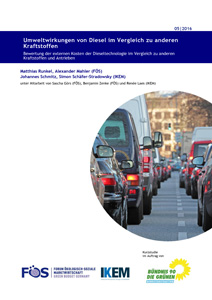
Schmitz, Johannes; Schäfer-Stradowsky, Simon; Runkel, Matthias; Mahler, Alexander
Umweltwirkungen von Diesel im Vergleich zu anderen Kraftstoffen
IKEM und Forum Ökologisch-Soziale Marktwirtschaft (FÖS).
The IKEM study refutes the assumption that diesel engines are supposedly more efficient and thus, contribute to climate protection.

The share of diesel technology in the German car market has been increasing for years. Proponents argue that diesel cars contribute to climate protection in road traffic because they generate less CO2 due to more efficient engines. For this reason, the use of diesel technology will continue to be promoted through tax systems and legal frameworks.
The present study conducted by FÖS and IKEM on behalf of the German parliamentary group Bündnis 90 / Die Grünen shows, however, that the supposed climate advantage no longer exists.
The main reasons for this are increasing efficiency gains in other drive systems and the exploitation of the savings potential in diesel technology. Comparatively higher exposure to nitrogen oxides and other pollutants even makes diesel the most harmful of the technologies considered.

Study: Environmental impact of diesel compared to other fuels
Principal: Bundestagsfraktion Bündnis 90/Die Grünen
Project partner: Forum Ökologisch-Soziale Marktwirtschaft
Duration: 11/2015–02/2016
